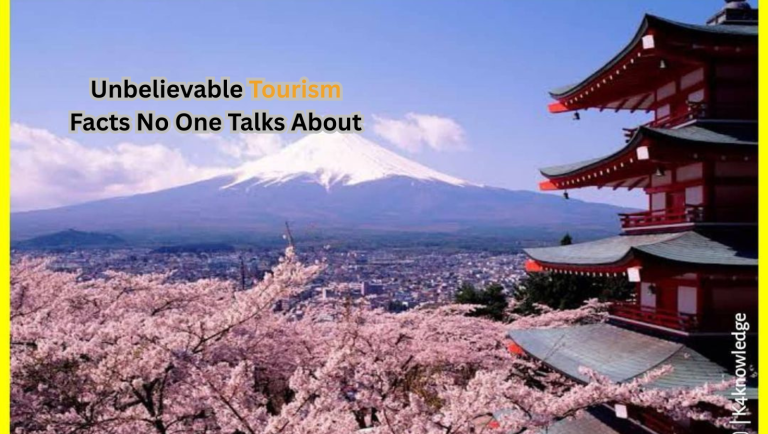Welcome to your omanreport ultimate source for discovering the most fascinating insights from around the globe. Tourism is often painted as just sightseeing and relaxation, but behind every trip lies an incredible web of secrets, facts, and astonishing realities that most travelers never learn about. From hidden histories to bizarre customs and mind-blowing statistics, tourism has surprises that can leave anyone amazed. Today, we uncover some of the most unbelievable tourism facts that no one talks about. Prepare to see travel in a whole new light.
Most Surprising Destinations You’ve Never Heard Of
The Hidden Wonders of Small Towns
While major cities like Paris, Rome, or Tokyo dominate travel lists, some of the world’s most astonishing experiences hide in small towns. For instance, Colchani in Bolivia isn’t just a salt flat gateway; it’s a surreal landscape where the sky seems to merge with the ground, creating otherworldly reflections. These overlooked destinations provide unique experiences without the chaos of tourist crowds.
Unusual Natural Attractions
Beyond famous landmarks, the planet is dotted with nature’s hidden marvels. Did you know that in New Zealand, there are glowworm caves where thousands of tiny bioluminescent worms light up underground chambers like a starry sky? Or that in India’s Meghalaya region, living root bridges are grown over decades, creating natural pathways stronger than concrete bridges? Nature has a mysterious and artistic way of captivating travelers who seek the extraordinary.
Bizarre Tourist Traditions Around the World
Festivals You Wouldn’t Believe Exist
Some tourist attractions aren’t just about places—they’re about the experiences. In Spain, the “La Tomatina” festival invites thousands to a massive tomato fight, while in Japan, the Naki Sumo festival celebrates crying babies with sumo wrestlers. These unusual traditions create memories that are completely unlike standard sightseeing trips.
Culinary Adventures for the Brave
Food tourism has its own set of strange adventures. In Iceland, travelers can taste hákarl, a fermented shark dish that many describe as the ultimate test of courage. Similarly, in the Philippines, balut—a fertilized duck egg—is considered a delicacy. For travelers willing to push their limits, these culinary experiences are unforgettable.
Astonishing Tourism Statistics That Defy Belief
The Economic Impact of Tourism
Tourism isn’t just fun; it’s a global powerhouse. According to recent studies, tourism contributes over 10% of the world’s GDP, supporting millions of jobs worldwide. The revenue from even a single landmark, like the Eiffel Tower or Machu Picchu, can exceed that of some small nations’ annual economies. The scale of tourism’s impact often goes unnoticed by casual travelers.
Record-Breaking Tourist Numbers
Certain destinations attract staggering numbers of visitors every year. For example, the Great Wall of China sees over 10 million visitors annually, while Times Square welcomes nearly 50 million tourists each year. These numbers highlight humanity’s fascination with iconic sites and the sheer scale of global travel.
Hidden Dangers Tourists Rarely Know
Risky Adventures and Safety Precautions
While adventure tourism is exciting, it’s not without danger. Activities like skydiving, deep-sea diving, or trekking in remote mountains can pose serious risks. Surprisingly, even visiting crowded urban attractions can be risky due to petty crime or accidents. Travelers must always prioritize safety while seeking thrilling experiences.
Environmental Impact of Tourism
Tourism also leaves a mark on the environment. Overcrowding in places like Venice or the Galápagos Islands has led to strict visitor limits to protect delicate ecosystems. Understanding the hidden consequences of travel can make tourists more responsible and preserve destinations for future generations.
The Psychological Effects of Travel
How Travel Changes Your Brain
Studies show that traveling can actually improve mental health, reduce stress, and boost creativity. Exploring new cultures forces the brain to adapt, enhancing problem-solving skills and emotional intelligence. Surprisingly, travelers often report feeling more empathetic and open-minded after experiencing life outside their comfort zones.
Travel as a Tool for Personal Growth
Tourism is more than leisure—it’s a path to personal transformation. Facing unfamiliar languages, navigating foreign cities, and engaging with diverse communities builds resilience, confidence, and cultural awareness. This psychological benefit is often overlooked but is one of the most rewarding aspects of travel.
Amazing Architectural Wonders You Might Miss
Secret Structures Hidden in Plain Sight
While landmarks like the Pyramids or Taj Mahal are world-famous, many architectural marvels remain hidden. For instance, Italy’s Civita di Bagnoregio is a town perched atop a fragile hill, accessible only by footbridge. In India, the stepwells of Gujarat are intricate underground water systems that resemble elaborate palaces. Exploring these hidden wonders can redefine what you think of as “tourist attractions.”
Futuristic and Mind-Bending Designs
Modern tourism also includes cutting-edge architecture. Dubai’s Museum of the Future features a torus-shaped building with an Arabic calligraphy façade, while Singapore’s Gardens by the Bay combines nature with futuristic technology. These destinations showcase how tourism can also be a celebration of human creativity.
Fascinating Cultural Experiences You Can Only Find Abroad
Immersive Local Traditions
To truly understand a destination, tourists must immerse themselves in local life. Participating in traditional tea ceremonies in Japan, learning flamenco in Spain, or joining a tribal festival in Africa provides insights that no guidebook can offer. These experiences make travel profoundly memorable.
Volunteer Tourism
A growing trend in tourism is volunteering abroad. Travelers can combine exploration with meaningful work, from wildlife conservation in Costa Rica to community education projects in Nepal. This type of tourism not only enriches the traveler’s experience but also positively impacts local communities.
FAQS
What is the most unusual festival for tourists?
One of the most unusual festivals is Spain’s La Tomatina, where participants engage in a massive tomato fight. This event is chaotic, colorful, and attracts thousands of international visitors each year.
Are there hidden travel dangers I should know about?
Yes. Adventure tourism activities like trekking, scuba diving, or extreme sports carry risks. Even popular urban destinations can pose dangers like theft or accidents. Always research safety tips and precautions.
Which small towns offer the most surprising experiences?
Small towns like Colchani in Bolivia, Civita di Bagnoregio in Italy, and Ait Benhaddou in Morocco offer unique landscapes, cultural richness, and fewer tourists, making them extraordinary destinations.
Can traveling really improve mental health?
Absolutely. Travel reduces stress, enhances creativity, boosts empathy, and improves problem-solving skills. Experiencing new cultures and environments has measurable positive effects on the brain.
How does tourism affect the environment?
Tourism can strain natural resources, increase pollution, and damage ecosystems. Popular destinations often implement limits or sustainable practices to reduce these impacts. Responsible travel helps preserve these sites for future generations.
Conclusion
Tourism is far more than what meets the eye. Beyond popular landmarks and luxury vacations lies a world of hidden wonders, bizarre traditions, mind-blowing statistics, and personal growth opportunities. Understanding the unseen aspects of tourism transforms every trip into an unforgettable adventure, enriching both the traveler and the destinations they visit. By exploring these unbelievable tourism facts, we gain a deeper appreciation for the incredible complexity, beauty, and power of global travel. So the next time you pack your bags, remember: there’s always more than meets the eye, and the world is waiting to astonish you.


